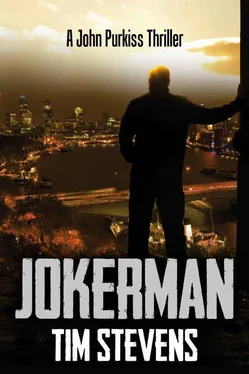Tim Stevens - Jokerman
Здесь есть возможность читать онлайн «Tim Stevens - Jokerman» весь текст электронной книги совершенно бесплатно (целиком полную версию без сокращений). В некоторых случаях можно слушать аудио, скачать через торрент в формате fb2 и присутствует краткое содержание. Год выпуска: 2013, Жанр: Триллер, на английском языке. Описание произведения, (предисловие) а так же отзывы посетителей доступны на портале библиотеки ЛибКат.
- Название:Jokerman
- Автор:
- Жанр:
- Год:2013
- ISBN:нет данных
- Рейтинг книги:4 / 5. Голосов: 1
-
Избранное:Добавить в избранное
- Отзывы:
-
Ваша оценка:
- 80
- 1
- 2
- 3
- 4
- 5
Jokerman: краткое содержание, описание и аннотация
Предлагаем к чтению аннотацию, описание, краткое содержание или предисловие (зависит от того, что написал сам автор книги «Jokerman»). Если вы не нашли необходимую информацию о книге — напишите в комментариях, мы постараемся отыскать её.
Jokerman — читать онлайн бесплатно полную книгу (весь текст) целиком
Ниже представлен текст книги, разбитый по страницам. Система сохранения места последней прочитанной страницы, позволяет с удобством читать онлайн бесплатно книгу «Jokerman», без необходимости каждый раз заново искать на чём Вы остановились. Поставьте закладку, и сможете в любой момент перейти на страницу, на которой закончили чтение.
Интервал:
Закладка:
‘Fair enough,’ Kasabian said. ‘I’ll have them here within the hour.’
‘What was he like?’ said Purkiss. ‘Morrow.’
She tilted her head. ‘I didn’t know him all that well. I mean, I knew about him — it’s my job to — and I’d met him a few times. Quiet, a solid worker. No spectacular successes, but no cock-ups either. To be honest, he’s the sort of person the Service needs more of. The hard workers, the dogged, incremental achievers. Not the glory seekers, the ones who joined because they imagined they were on a television programme.’
She disappeared to fetch the files.
Purkiss said to Vale, ‘I didn’t know that. About Kasabian having an affair with the politician.’
‘Very few people do.’ Without a hint of smugness, or intrigue, Vale went on: ‘You wouldn’t believe the things that aren’t public knowledge about some of the senior figures in the British Establishment. They’d make your eyes water.’
‘Oh, I’d believe them.’ Something else occurred to Purkiss. ‘Does she really have children?’
‘A son.’
He didn’t say any more, and Purkiss didn’t press him.
Ninety minutes later, Purkiss was alone in the flat with a pile of folders. Kasabian and Vale had both left — Vale had seemed on the point of asking if Purkiss wanted him to stay and camp out on the floor, but thought better of it — and Purkiss had made a call to the National Hospital. Kendrick was still in theatre. There’d be no point in Purkiss’s phoning until the morning, he was told. They promised to ring him before then should things take a turn for the worse.
Purkiss sat at the small dining table they’d used for the polygraph apparatus, and worked his way through the paperwork. He’d taken a speed-reading course at university to help cope with all the reading, and what he’d learned had stayed with him. He wasn’t looking to memorise all the details just yet; rather, he was giving his mind food to digest while he slept. Sometimes answers presented themselves in the morning, sometimes not.
Charles Morrow had been a forty-eight year old, divorced, childless agent of almost twenty-five years’ standing. His ex-wife was Kurdish, a refugee from Saddam’s Iraq, and Morrow appeared to have an abiding interest in the country and its people. Since the 2003 Coalition invasion, the majority of his work had been monitoring expatriate Iraqi groups in Britain for links with the insurgents back in the home country, the ones who were planting bombs in the marketplaces in Baghdad and Basra and gunning down newly recruited policemen.
Many of Morrow’s reports were sketchy, providing gists rather than details. Purkiss could understand this. There were some things that weren’t suitable to be written down, things that might compromise people’s safety if they fell into the wrong hands. Names of informers, for instance, whom Morrow might be paying out of his own pocket.
The thickest document of all was the internal personnel file on Morrow himself. Purkiss was unsurprised at the level of detail recorded. He’d seen similar files within his own former organisation, SIS. It was as if the Service owned you. Morrow’s sexual liaisons featured, of course, none of them especially noteworthy. He hadn’t been subject to any disciplinary proceedings. His estimated alcohol intake was average for a spook, which meant well above the recommended limits, but not spectacularly so. His politics were soft left.
Names, dates, figures… they began to swirl randomly in Purkiss’s head, linking up incorrectly with each other. After an hour’s reading he decided it would be counterproductive to try to absorb any more tonight. It was three in the morning, and six hours earlier Purkiss had been attacked in his own home by a gunman, and seen his friend shot in the head. Like it or not, he needed rest.
He bedded down in the main bedroom. The mattress felt taut, new, the air conditioning still failing to expel the stuffiness of what was clearly a seldom-used flat. Purkiss tossed and turned, unable to get comfortable.
His last waking thought was that of the two people he could plausibly call his friends over the last few years, both had been shot in front of his eyes. And in some way because of him.
Twelve
Purkiss woke at seven o’clock with a name in his head.
Mohammed Al-Bayati.
Pattern recognition was something that had been identified as a strength of his, during Purkiss’s initial evaluation when he’d joined SIS. The ability to differentiate foreground from background when the distinction wasn’t immediately obvious, or indeed was highly obscure. The skill applied to visual patterns as well as aural and verbal ones.
Many names had cropped up time and time again in Morrow’s reports. Yet this one stood out: Mohammed Al-Bayati . Why?
In the flat’s tiny bathroom Purkiss found a new toothbrush, still in its packaging, and a safety razor. He shaved, showered, and examined the contents of the bedroom wardrobe. A few sets of unremarkable clothes, once again all new and waiting for a visiting agent to use. Taller than most, Purkiss found that nothing fit. He settled for the underwear and put his own clothes from yesterday back on.
While he boiled the kettle for instant coffee, Purkiss phoned the hospital. Kendrick had left theatre, had done several hours ago, and was in Intensive Care. The doctor Purkiss spoke to said there was cerebral oedema. Fluid around the brain. If Kendrick did wake up, it wouldn’t be for a while yet.
Over coffee and toast, Purkiss flicked through the Morrow documentation again, this time on the lookout for every mention of Mohammed Al-Bayati he could spot. This was one of the areas where digital records really came into their own, he thought; he’d get what he wanted at the click of a mouse. Perhaps he ought to go out and buy a cheap scanner and laptop? But that would take more time than it was worth. Besides, Kasabian had said there was to be no electronic trail, and there was no point in going against her wishes. Not yet, anyway.
So Purkiss slogged on. He found the name in memos, in email transcripts, in simple lists with cryptic numbers for titles, in notes Morrow had scribbled to himself. It soon became clear that Al-Bayati was both someone Morrow met personally on a frequent basis, and that he was the head of a group based in London calling itself Iraqi Thunder Fist . Or that was the translation from the Arabic, in any case.
Purkiss made some more coffee, then started to look for repeated references to Iraqi Thunder Fist . He found an entire briefing about the organisation, cut and pasted and printed out. The group was based in London, with branches in Amsterdam, Copenhagen and Marseille, Purkiss’s old stamping ground. The London headquarters was the hub of the outfit. Made up of a mixture of exiled members of the Saddam clique, disaffected senior Iraq Army soldiers forcibly demobbed without ceremony after the Coalition takeover, and opportunistic Islamist fanatics, Iraqi Thunder Fist was committed to the overthrow of the existing government in Baghdad and the restoration of what it termed a genuinely representative and patriotic state. Morrow had added amendments to the text, inserting evidence of ITF training activities for guerillas who were sent back to Iraq to plant Improvised Explosive Devices along major thoroughfares, and of fundraising efforts ostensibly meant to provide for the widows of locals killed during the invasion but in fact set up to buy arms from private dealers in Russia, arms destined to be channelled back into the homeland.
Returning to his trawl for the Mohammed Al-Bayati name, Purkiss found no further associations with the Iraqi Thunder Fist group. He did, however, notice another word, Dolphin , which Morrow clearly used as some sort of code, and which cropped up three times in connection with Al-Bayati.
Читать дальшеИнтервал:
Закладка:
Похожие книги на «Jokerman»
Представляем Вашему вниманию похожие книги на «Jokerman» списком для выбора. Мы отобрали схожую по названию и смыслу литературу в надежде предоставить читателям больше вариантов отыскать новые, интересные, ещё непрочитанные произведения.
Обсуждение, отзывы о книге «Jokerman» и просто собственные мнения читателей. Оставьте ваши комментарии, напишите, что Вы думаете о произведении, его смысле или главных героях. Укажите что конкретно понравилось, а что нет, и почему Вы так считаете.












